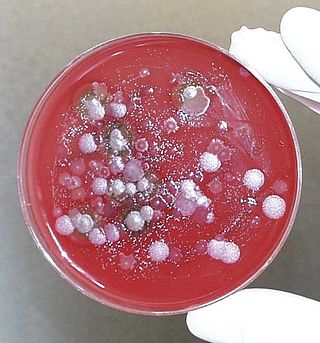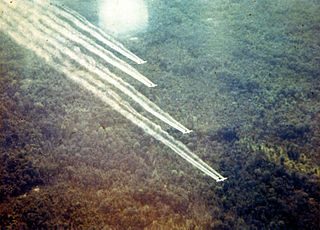
Biological warfare, also known as germ warfare, is the use of biological toxins or infectious agents such as bacteria, viruses, insects, and fungi with the intent to kill, harm or incapacitate humans, animals or plants as an act of war. Biological weapons are living organisms or replicating entities. Entomological (insect) warfare is a subtype of biological warfare.
Defense or defence may refer to:
Transformation may refer to:
UW, U.W., Uw, or uw may refer to:
Amphibious means able to use either land or water. In particular it may refer to:
Incapacitating agent is a chemical or biological agent which renders a person unable to harm themselves or others, regardless of consciousness.

Unit 731, short for Manshu Detachment 731 and also known as the Kamo Detachment and the Ishii Unit, was a covert biological and chemical warfare research and development unit of the Imperial Japanese Army that engaged in lethal human experimentation and biological weapons manufacturing during the Second Sino-Japanese War (1937–1945) and World War II. It killed an estimated 200,000 to 300,000 people. It was based in the Pingfang district of Harbin, the largest city in the Japanese puppet state of Manchukuo and had active branch offices throughout China and Southeast Asia.
Biological defense may refer to:
EW, Ew, or ew may refer to:

A biological agent is a bacterium, virus, protozoan, parasite, fungus, or toxin that can be used purposefully as a weapon in bioterrorism or biological warfare (BW). In addition to these living or replicating pathogens, toxins and biotoxins are also included among the bio-agents. More than 1,200 different kinds of potentially weaponizable bio-agents have been described and studied to date.
CBN, or cbn, may refer to:

Herbicidal warfare is the use of substances primarily designed to destroy the plant-based ecosystem of an area. Although herbicidal warfare use chemical substances, its main purpose is to disrupt agricultural food production and/or to destroy plants which provide cover or concealment to the enemy, not to asphyxiate or poison humans and/or destroy human-made structures. Herbicidal warfare has been forbidden by the Environmental Modification Convention since 1978, which bans "any technique for changing the composition or structure of the Earth's biota".
An ethnic bioweapon is a hypothetical type of bioweapon which could preferentially target people of specific ethnicities or people with specific genotypes.
Interaction is action that occurs between two or more entities, generally used in philosophy and the sciences. It may refer to:
Dew is the condensation of atmospheric water vapour into droplets.
The United States biological weapons program officially began in spring 1943 on orders from U.S. President Franklin Roosevelt. Research continued following World War II as the U.S. built up a large stockpile of biological agents and weapons. Over the course of its 27-year history, the program weaponized and stockpiled the following seven bio-agents :

Allegations that the United States military used biological weapons in the Korean War were raised by the governments of the People's Republic of China, the Soviet Union, and North Korea. The claims were first raised in 1951. The story was covered by the worldwide press and led to a highly publicized international investigation in 1952. Secretary of State Dean Acheson and other American and allied government officials denounced the allegations as a hoax. Subsequent scholars are split about the truth of the claims.
This page is based on this
Wikipedia article Text is available under the
CC BY-SA 4.0 license; additional terms may apply.
Images, videos and audio are available under their respective licenses.




